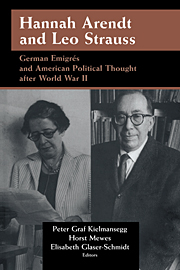Book contents
- Frontmatter
- Introduction
- PART I HANNAH ARENDT
- PART II LEO STRAUSS
- 4 Reflections on Leo Strauss and American Education
- 5 Leo Strauss: The Quest for Truth in Times of Perplexity
- 6 Leo Strauss and Martin Heidegger: Greek Antiquity and the Meaning of Modernity
- 7 Leo Strauss: German Origin and American Impact
- 8 The Modern World of Leo Strauss
- PART III ROUNDTABLE DISCUSSION
- Select Bibliography of Works by Arendt and by Strauss on Modern Political Science and Philosophy
- Index
7 - Leo Strauss: German Origin and American Impact
Published online by Cambridge University Press: 05 January 2013
- Frontmatter
- Introduction
- PART I HANNAH ARENDT
- PART II LEO STRAUSS
- 4 Reflections on Leo Strauss and American Education
- 5 Leo Strauss: The Quest for Truth in Times of Perplexity
- 6 Leo Strauss and Martin Heidegger: Greek Antiquity and the Meaning of Modernity
- 7 Leo Strauss: German Origin and American Impact
- 8 The Modern World of Leo Strauss
- PART III ROUNDTABLE DISCUSSION
- Select Bibliography of Works by Arendt and by Strauss on Modern Political Science and Philosophy
- Index
Summary
Leo Strauss is one of the most influential figures of twentieth-century political philosophy. He has published fifteen books and a great number of articles; his work covers the occidental history of thought from its beginnings to the present and links several other disciplines, such as theology, classical philology, and medievalistics, with its philosophical core. At the same time, Strauss has remained one of the most controversial figures within this discourse. This is, among other things, due to the fact that he advocates a very remote epistemological ideal, that of Greek antiquity, while insisting simultaneously on a direct and practical topicality. The following line of reasoning is founded on the conviction that this scholar's way of thinking is hard to classify and is based on a political attitude that could be called “ultraconservative” - a term that will have to be defined more clearly. His way of thinking can be differentiated from modern philosophy of the early twentieth century by its turn to Jewish tradition and it follows an inner logic that can be reconstructed according to a secularization model of theological origin. Accordingly, the accent in this essay will be put on both the less well-known early writings and the formative writings of the middle period, while the later works will only be touched upon because as yet too little is known of their impact.
- Type
- Chapter
- Information
- Hannah Arendt and Leo StraussGerman Émigrés and American Political Thought after World War II, pp. 121 - 138Publisher: Cambridge University PressPrint publication year: 1995



